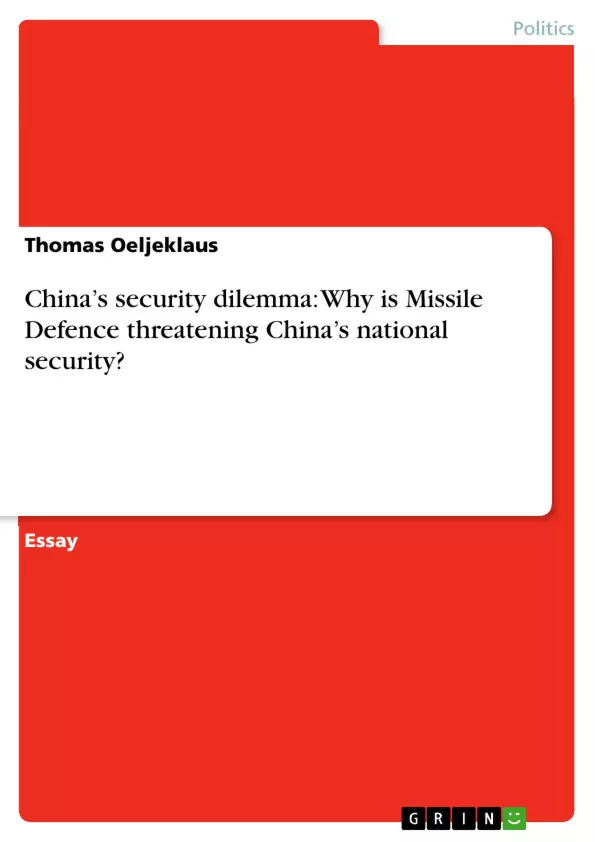Strengthening a country’s defences should neither alarm its neighbours nor lead to an arms race. Despite this theoretical cognition of political sciences, the People’s Republic of China sees Ballistic Missile Defence as a threat to its national security.
The aim of this essay is to explain why the BMD systems of the USA are threatening China’s national security. I will show that it is mainly a psychological discourse. Although, or precisely therefore, it is very important for the understanding of China’s position and assumptions.
We will understand that China faces a security dilemma which is threatening the national security and ultimately lead to an arms race.
I will show that the technical aspects here are not as important as the psychological implications. Missile Defence “hints at the psychological side of international politics.” The US’s BMD systems may not work well enough to be technically a real threat to any country, but the development and instalment causes China’s threat perceptions. BM is used “as a saber-rattling show of force, for intimidation in order to reach a political goal or simply as deterrence against a perceived outside threat or imminent attack.”
For the People’s Republic of China there are two main issues: First, a period of strategic transition between the United States of America and the People’s Republic of China and second, the US transfer of advanced PAC-3 Systems to Taiwan.
“The negative impact of missile defense deployments on Sino-US relations could potentially be reduced by offsetting them with political and economic measures to reassure China.”
Chinas concerns about missile defence focus mainly on political questions. Thoughts, fears and perceptions of Chinese officials and experts focus on Japanese militarization, the possibility that TMD would encourage Taiwan’s independence and the uncertainty about US intentions toward China. I will focus on the uncertainty about US intentions but I can’t leave out the other two aspects totally.
We will have a better understanding of the Chinese mind if we are aware of China’s principle national priorities. On the one hand the Communist Party wants stay in power. For this reason they need social stability. On the other hand the economic development is very important for the country. It is the goal to have a continued economic growth. Additionally this plays in favour of social stability.
Inhaltsverzeichnis (Table of Contents)
- Introduction
- China's Perceptions
- NMD will break the strategic balance
- Missile Defence is not purely defensive - China's nuclear deterrence capability and national security is threatened
- Missile Defence systems are actually targeting China
- Conclusion
Zielsetzung und Themenschwerpunkte (Objectives and Key Themes)
This essay aims to analyze why the Ballistic Missile Defence (BMD) systems of the USA are threatening China's national security. It argues that the threat is primarily psychological, focusing on China's perception of US intentions and the implications for its own security. Key themes explored in the text include:- China's security dilemma and its perception of BMD as a threat
- The psychological impact of BMD on China's strategic thinking
- The role of US BMD in shaping China's national security concerns
- The potential for an arms race stemming from China's perception of BMD
- The importance of understanding China's national priorities and strategic transition
Zusammenfassung der Kapitel (Chapter Summaries)
Introduction
This chapter introduces the topic of China's perception of Ballistic Missile Defence (BMD) as a threat to its national security. It highlights the discrepancy between the theoretical understanding of strengthening defenses and China's view of BMD as an alarming development.China's Perceptions
This section delves into the specific anxieties China holds regarding BMD systems, particularly those deployed by the US. It examines three key concerns: * **NMD will break the strategic balance:** China fears that BMD will disrupt the existing strategic balance, potentially undermining its nuclear deterrence capabilities. * **Missile Defence is not purely defensive:** China argues that BMD is not purely defensive and poses a direct threat to its national security by weakening its nuclear deterrent. * **Missile Defence systems are actually targeting China:** China suspects that the US BMD systems are specifically targeting it, creating a sense of insecurity and mistrust.Schlüsselwörter (Keywords)
This essay explores the multifaceted issue of China's national security, focusing on its perception of Ballistic Missile Defence (BMD) systems, particularly those developed and deployed by the US. Key terms and concepts central to the analysis include: * BMD (Ballistic Missile Defence) * NMD (National Missile Defence) * Strategic Balance * Nuclear Deterrence * Threat Perception * Security Dilemma * Arms Race * Strategic TransitionFrequently Asked Questions
Why does China perceive US Missile Defence as a threat?
China fears that Ballistic Missile Defence (BMD) disrupts the strategic balance by potentially neutralizing its nuclear deterrence capabilities, creating a psychological sense of insecurity.
What is the "security dilemma" in this context?
The security dilemma occurs when one country (the US) strengthens its defenses, leading another country (China) to feel threatened and respond with its own military buildup, potentially starting an arms race.
Is the threat of BMD technical or psychological?
The essay argues it is primarily psychological. Even if the systems are not technically perfect, the intent and deployment create a perception of threat that influences China's national security policy.
How does the transfer of PAC-3 systems to Taiwan affect China?
The transfer of advanced missile defense systems to Taiwan is seen by China as a provocation that might encourage Taiwanese independence and undermines China's regional security interests.
What are China's national priorities regarding security?
China's priorities include maintaining the Communist Party's power, ensuring social stability, and fostering continued economic growth, all of which are perceived to be at risk if the strategic balance is broken.
- Quote paper
- Thomas Oeljeklaus (Author), 2008, China’s security dilemma: Why is Missile Defence threatening China’s national security?, Munich, GRIN Verlag, https://www.grin.com/document/134456



